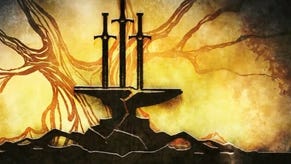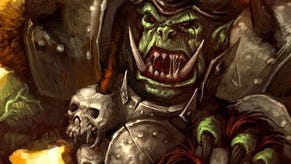Warhammer: Age of Reckoning
From table top to laptop. See what we did there?
What's my motivation?
It's clear that Paul Barnett wouldn't approve of the past few paragraphs. He'd point out that these are dry facts, and instead want to elaborate on the motivations of the races. And it's important that he does, as it represents the depth of thinking that is going into the game. When you first see Chaos - a race that thrives on disorder, and the breaking down of reality - it might be hard to see the appeal in playing an opposing human Empire. Chaos might grow a tentacle out their bum at any moment, infecting the world around them. So why would I be the race I already am?
"Empire is a world about the End of Days," bellows Paul. "A world on the brink of extinction. No matter what they do, the Humans must keep fighting or they'll all die. Breed and fight, expand or die, that's all they can do. The Empire deals with the strengths and weaknesses of human beings, their humanity. Their fantastic dreams, their terrible nightmares. It's that idea that when they get magic, they can't stop themselves. They get super-magic and blow the world up. When they figure out how to harvest food, they harvest until extinction."
And then of course, you could always be an Empire Bright Wizard - a magnificently regal result of the lies the Elves told the Humans about magic. They're fire wizards, and everything the do involves fire, and a lot of it. There's the Warrior Priest, a melee pro and a healer, who gains his "faith" through combat. Or perhaps you'd choose a Witch Hunter, expert in melee, but also equipped with an impressive gun (and hat). Oh, or why not a Knight of the Blazing Sun, tanking your way along in your ridiculous get-up?
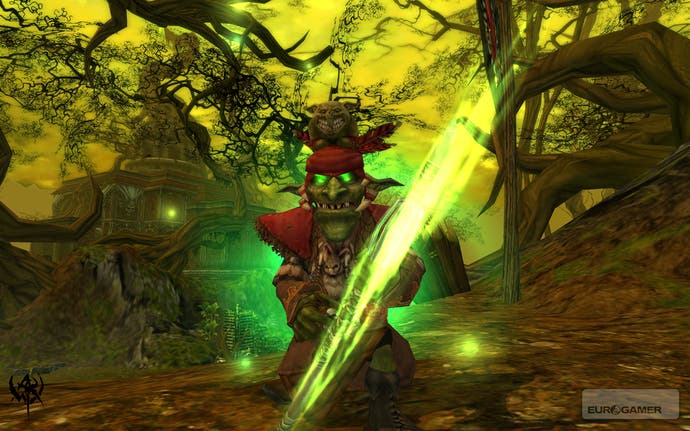
While there are only four classes per race, their distinctions are so great that it begins to look like twenty-four classes. Essentially divided up into tanker, melee, healer and magic, it's far more involved than that. The Empire's Warrior Priest is a healer, but don't expect to be standing at the back, bored. He gains his aiding abilities only through the violence he's giving out and receiving. There's no background characters in Warhammer, and as such everyone's involved in the fight.
Level headed
Previously Mythic had intended to completely abandon levels, and hence levelling, in an attempt to divert people from the grind and focus on the events. While an interesting idea, Hickman points out that it just didn't click for them. "We've tried to stay with the principle behind that as much as we can. When you play the game you still get this mini-movement within a rank. If you want to call a rank a 'level' you're welcome to do that. Basically what we found was that it's so important that a player feels his progress definitively. There needs to be easy comparison between that monster and you."
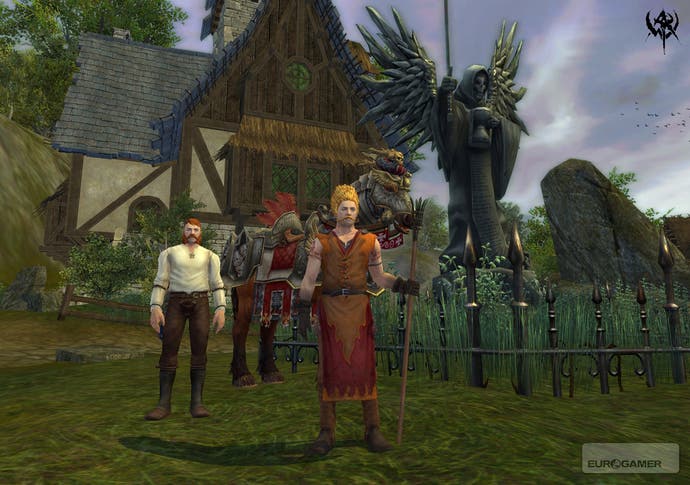
However, that doesn't mean the ambition is abandoned. "I don't want to say we stepped back from the old system because we've kept a lot of it. Within each rank, you're still gaining Abilities, Moral and Tactics. And they're not at the same point each rank - some ranks you'll get two, others you'll get four - there's definite variation of reward, trying to cut that feeling of, 'I've got to climb another level'. We loved the idea behind it, and we could probably make it work, but it didn't feel right. So we went back to giving people a way of measuring. The old system is still there, but it's running underneath."
Good grief
Building on the experience of six years of Dark Age of Camelot, Mythic has the advantage of being one of the very few second-generation MMO developers, with knowledge of the problems that befall a new project. And in a world so stuffed with PvP, griefing would be the most obvious one. Jeff leaps in.
"The RvR system is very carefully constructed to prevent such problems, from simple ideas to complex devices. Simple things like bad guys can't talk to good guys to prevent smack-talking. (Can I dance on your corpse? Absolutely. But there's a bit of fun to that. See, when you die, your gravestone might be left there. Your gravestone could have funny things on it about who killed you and how)."
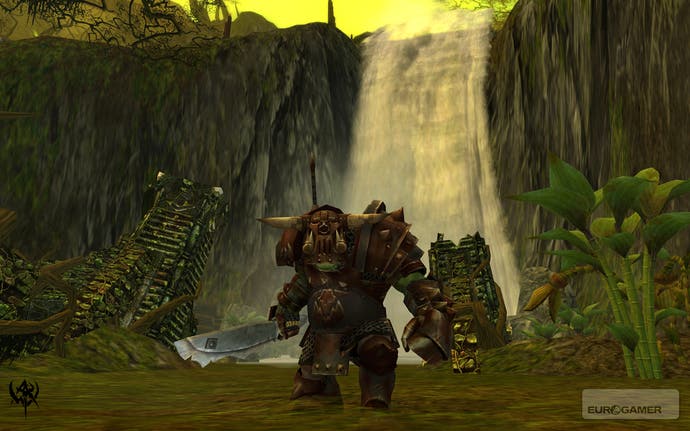
And on the more complicated level? "Well, for instance, we're not letting high-level characters come down and gank low-level characters. We're in fact pushing back against things like that. Say a fortieth level character comes into a fifth level zone, and he wants to run into an RvR area and kill the fifth level guys? Well, not only can he not attack them, but he doesn't even get flagged for RvR. He can't attack the low level guys at all. But that guy who comes down has a debuff placed upon him that makes him vulnerable to the low level guys. This is the kind of disincentive against griefing we're using."
There's lots more detail to come. Not all the races' classes are announced, but to prevent your crazed anger at not being told, the three freshly announced Chaos classes are Chosen (melee/tanker), Zeolot (magic/healer) and the Magus (spellcasters who fly around on a magic disc), and with a year's development still to go, more unique IP will be negotiated with Games Workshop as the team create their unique bubble in the Warhammer world. Will it beat WoW? Who cares? Will it offer something significantly different to WoW? From what we've seen and played, yes, absolutely.
Warhammer: Age of Reckoning is aiming for completion by the end of the year, with betas planned throughout. We'll certainly bring you more, including the unannounced details of the Elves, as soon as they appear.

